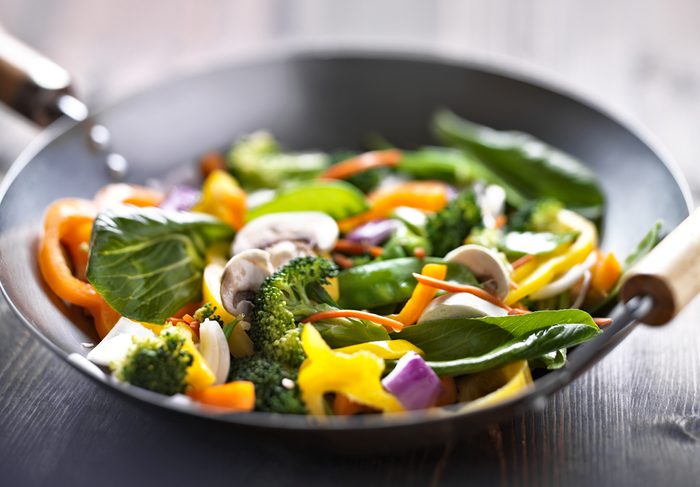
The Diet for a Healthy Heart
Heart disease and stroke are the major causes of death for women in Canada. But you can promote a strong ticker by choosing foods that offer protection from cardiovascular issues and by avoiding ones that may damage your body. One key way to keep your heart in top shape is to eat many different types of whole plant-based foods, says registered dietitian Rosie Schwartz. “Plant foods are filled with a variety of phytonutrients that work in all different ways to protect your heart,” she explains.
Some of those are antioxidants. Research shows that when LDL cholesterol (the bad kind that sticks around) is oxidized, it’s more likely to be deposited in the arteries, which can affect blood flow to the heart. Plant foods with antioxidants help protect against oxidization, explains Schwartz. And there’s much more!
“Many antioxidant-rich foods are also rich in anti-inflammatory compounds,” she says. “Inflammation affects several aspects of heart health, but the major one is how it damages arteries.” She notes that inflammation can also cause plaque in arteries to rupture and release blood clots.
Other benefits to whole plant-based foods include fibre, which may reduce blood cholesterol. Some plant-based foods contain nutrients like potassium, which can make you less sensitive to sodium and affect blood pressure, while others contain magnesium, which helps regulate blood pressure.
What about fat? Registered dietitian Abby Langer recommends that people eat a range of fats so they gain the benefits of a variety of nutrients. Try to avoid saturated fat, particularly from processed foods – though saturated fats like butter are fine in small amounts for most healthy people.
And trans fats? It’s time to kick them to the curb! “We know that trans fatty acids, which are present in bakery products and crackers, aren’t healthy,” she explains. Both saturated and trans fats boost blood cholesterol levels, which increase your risk of heart disease, heart attack and stroke. And we can’t forget about added sugar. “Sugar is thought to cause inflammation in the body, and this can affect your risk of diseases like diabetes, Alzheimer’s disease and heart disease,” says Langer, “so it’s a good idea to limit sugar as well.”
If you’re ready to give your heart some love, here are eight easy tips for eating in a heart-healthy way.
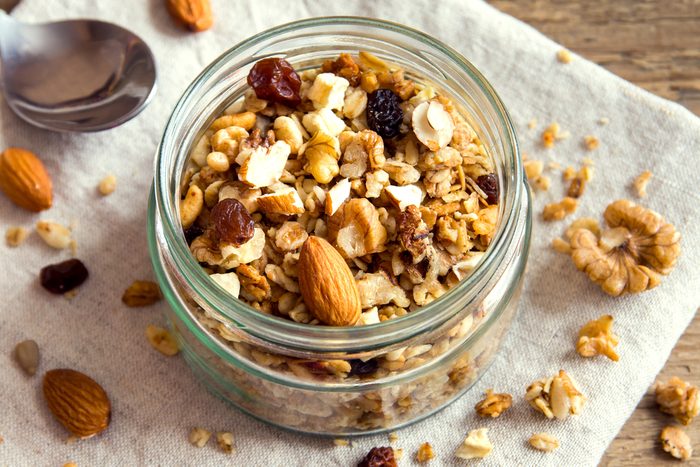
Make Homemade Granola
Processed foods can be a major source of added sugar and salt, say Langer and Schwartz, and that’s especially true when it comes to breakfast cereals. Granola is a fantastic option to make yourself: It’s easy to make, and the oats are a great source of blood-cholesterol-reducing dietary fibre. Plus, you can customize it with tons of other heart-friendly ingredients that suit your tastes, such as sliced almonds, unsweetened dried blueberries and unsweetened coconut flakes, which add sweetness without added sugar.

Boost Your Omega-3s
A study published last year in the Journal of the American College of Cardiology found that replacing the calories from saturated fat with calories from polyunsaturated fat, like omega-3 fatty acids, reduces your risk of coronary heart disease by 25 percent. It’s not about totally cutting out saturated fats but rather limiting them and increasing healthy fats. Today, try to incorporate inflammation-fighting ingredients like flaxseed, hemp seeds and canola oil in your snacks and meals. Another source of omega-3s is cold-water fish, such as mackerel and trout, which Schwartz recommends eating a couple of times a week.
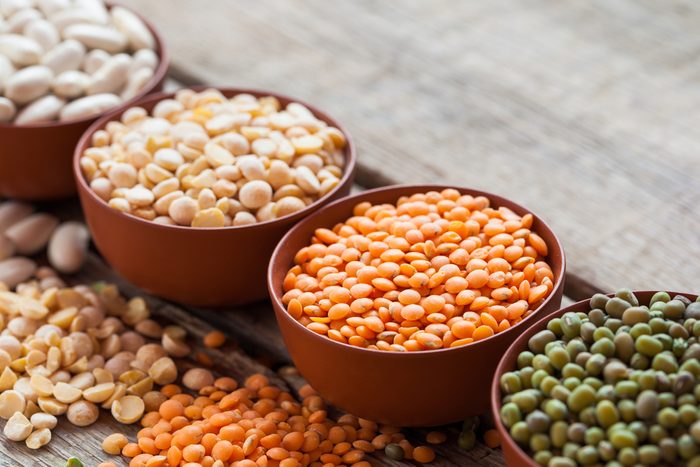
Pump Up Your Pulses
Lentils, chickpeas, dried beans and dried peas are an important part of heart health. “Name a nutrient and it seems as though pulses have it,” says Schwartz. They’re sources of potassium, antioxidants and cholesterol-lowering fibre, and they’re anti-inflammatory, too. Make a lentil meat loaf for dinner, roast some chickpeas to munch on or bake up a batch of bean-based “meatballs.”
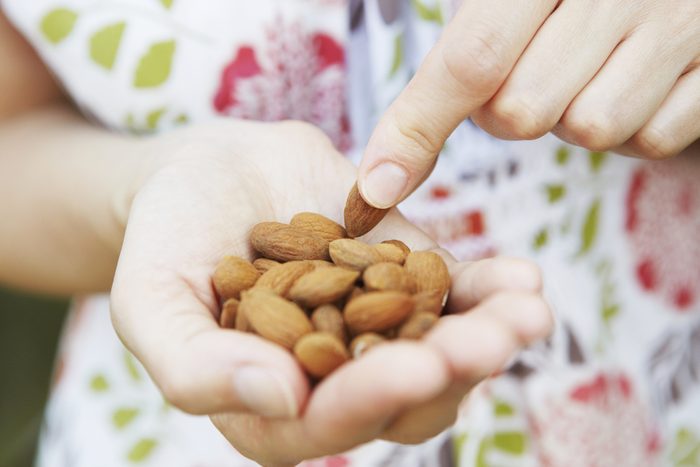
Go Nuts!
Nuts and seeds are heart-healthy powerhouses. The type of fat they contain, along with other nutrients, helps lower cholesterol. They also contain heart-boosting magnesium, particularly pumpkin seeds, which Schwartz says help regulate blood pressure. Walnuts are also a great way to get your omega-3s. Make nuts and seeds your regular snacks – just beware of defaulting to the same old trail mix, which can get boring fast. Spiced roasted nutsare a flavourful alternative. And here’s another clever way to work in more nuts: Blend cashews and water together to add to soups as a vegan alternative to saturated-fat-rich cream.
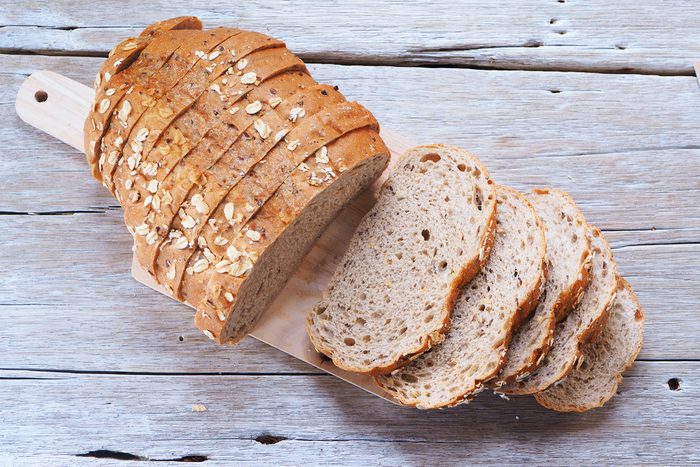
Grain Switcheroo
Whole grains are the only way to go. “They’re a good source of antioxidants and fibre, and they taste amazing,” says Langer. Bread is the hardest habit for people to break when it comes to switching to whole grains, but it’s recommended because the flour in white bread offers little nutritional value. Langer recommends sprouted grain bread, like Ezekiel bread, which contains little to no sugar. That doesn’t mean you have the green light to eat all the whole-grain bread, rice and pasta you want, though. To strike the right balance, limit grains to one cup per meal and fill the rest of your plate with fruits, veggies and protein.

Sugar, Sugar
The Heart and Stroke Foundation says eating too much sugar is a risk factor for heart disease, diabetes and high blood cholesterol. And Langer says all types of added sugars may cause health problems if you consume too much – even honey and maple syrup. “All sugar is treated the same, even high-fructose corn syrup,” she explains. “It’s metabolized differently than other sugars, but in the end it has the same effect on us.” Not sure where to start? The Heart and Stroke Foundation says that sweetened beverages are the biggest source of sugar in most people’s diets. “Start drinking water and cut down on sugar in your coffee, or cut it out altogether,” advises Langer.
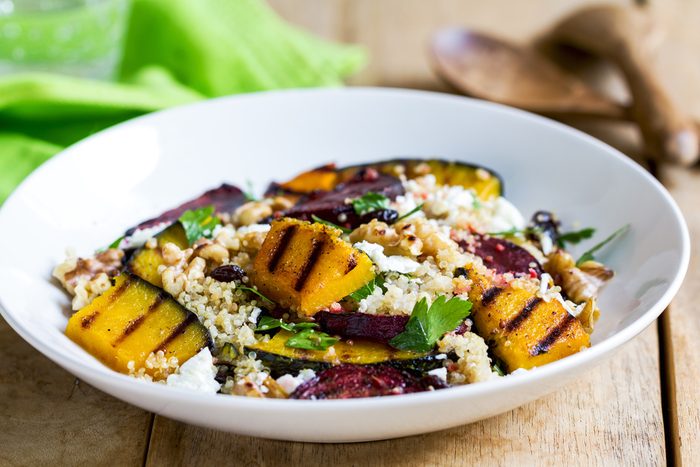
Veg Out!
Boosting the amount of vegetables you eat every day will definitely help keep your heart healthy. Langer suggests that you have two big handfuls of veggies at lunch and dinner. One way to make fitting them in a snap is to prep some in advance. Boost the winter blahs by roasting a colourful, antioxidant-packed kabocha squash. Keep it in your fridge and add it to a salad or as a side at dinner throughout the week. If you have a slow cooker, you can cook a big batch of veggies that way, too. Check out the new Best of Bridge The Family Slow Cooker cookbook, which has several veggie recipes in it, including Slow Roasted Whole Beets and Sugar Snap Peas with Mint.
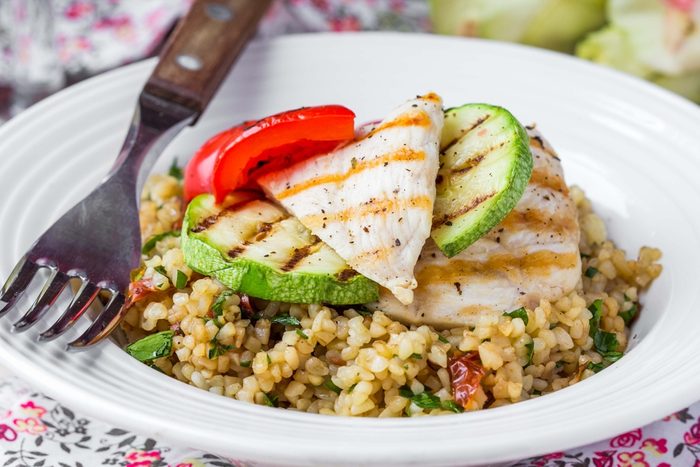
Think: Meatless Mondays (And Tuesdays and Wednesdays)
A heart-healthy diet can include meat, but most of us should cut down on how much pork, beef and chicken we consume because it can displace fruits, vegetables, whole grains and alternative proteins like tofu and pulses. “I recommend that people move away from eating meat often and consider more plant-based alternatives, which have been shown to be good for our cardiovascular risk factors,” says Langer. We also need to be mindful of the type of meat we choose. The Heart and Stroke Foundation says that fatty meats, such as full-fat ground beef and processed meats, can cause blood cholesterol levels to go up.
